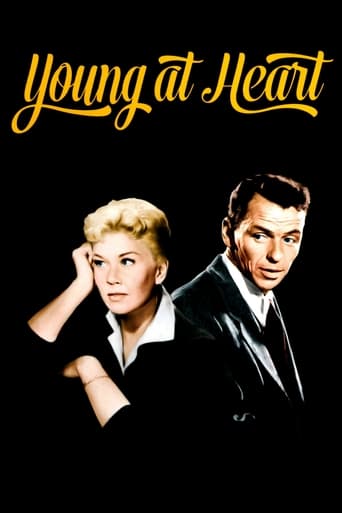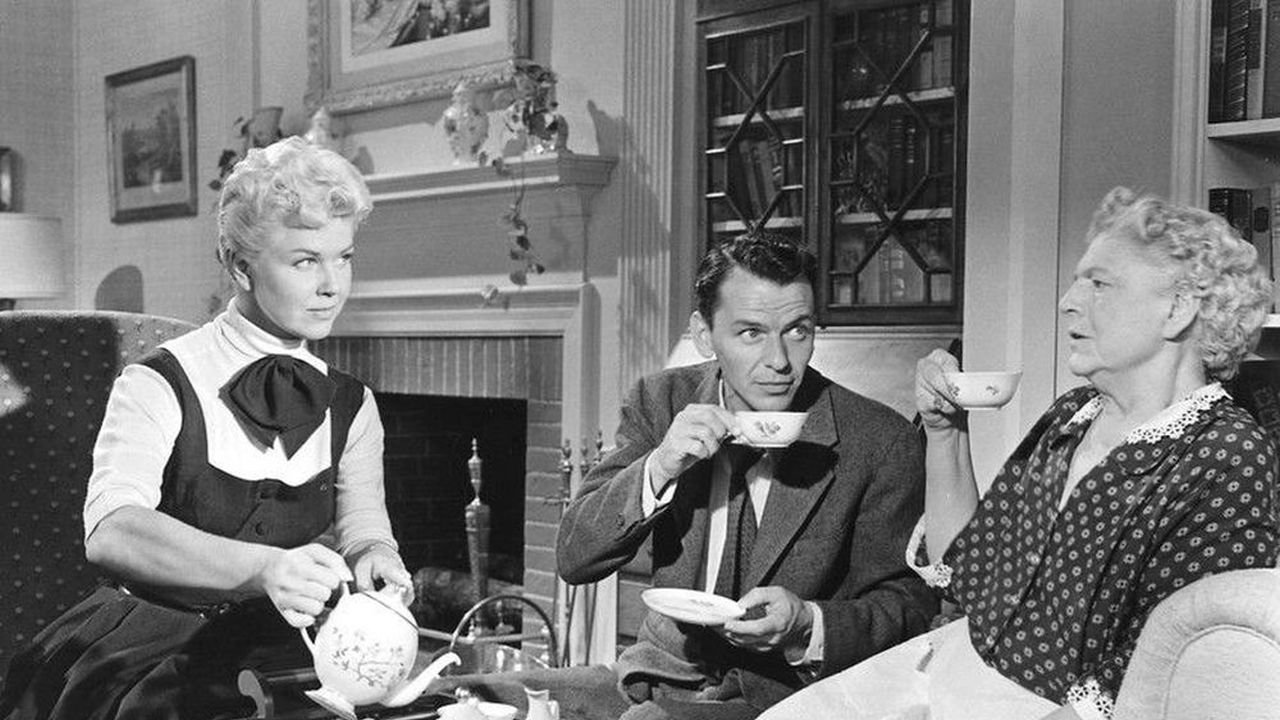Stormy_Autumn
"Young at Heart" is a beautiful story about the more mature love that grows in the relations of 3 daughters, (Laurie, Fran, Amy) & their boy friends (Barney, Alex, Bob). Tuttle Home is where a sarcastic, angry Barney Sloan (Frank) decides to work as part of a composing team. He's the piano man. He believes that the "fates" are out to get him & destroy his life. Lovely Laurie Tuttle (Doris) doesn't. Who will be right? This is one dramatic, musical everybody should see. This 1954 movie musical with some beautiful songs, especially one of my favorites "Young at Heart". Doris Day as Laurie Tuttle; Frank Sinatra as Barney Sloan; Gig Young as Alex Burke; Ethel Barrymore as Aunt Jessie Tuttle; Dorothy Malone as Fran Tuttle; Robert Keith as Gregory Tuttle; Elisabeth Fraser as Amy Tuttle; Alan Hale Jr. as Robert Neary; Lonny Chapman; as Ernest Nichols.(7.5 out of 10 out of TCM)
gftbiloxi
Throughout the 1930s and well into the 1940s musicals were inevitably lighthearted confections calculated to send the audience away filled with good cheer and humming a tune. In the late 1940s, however, a different type of musical emerged. The story was usually about a singer or a star or a musician, thus allowing plenty of room for the songs and production numbers the audiences expected--but far from being lighthearted, it was often a dark tale. It was, in a phrase, musical noir.Many performers took a turn in this genre, but there is really only one who did so consistently: Doris Day. Given her extremely popular comedies of the late 1950s and early 1960s, it is easy to forget that she had some serious acting chops--but home studio Warner Brothers was quick to spot her potential in this area and showcase it in such non-musicals as STORM WARNING. And although the studio certainly put her through many "light hearted musical" hoops, it also gave her several musicals in which her role was more dramatic than comic: MY DREAM IS YOURS, YOUNG MAN WITH A HORN, I'LL SEE YOU IN MY DREAMS--and in 1954 YOUNG AT HEART.The film is based on the 1938 FOUR DAUGHTERS and keeps much the same story. The Tuttles are a musical family: father Gregory (Robert Keith) and daughters Laurie (Doris Day), Fran (Dorothy Malone), and Amy (Elizabeth Fraser) are an instrumental quartet whose home lives are kept on even keel by non-musical Aunt Jessie (the legendary Ethel Barrymore.) When Laurie accepts a marriage proposal from handsome Alex Burke (Gig Young) it seems the most the family has to worry about is going from quartet to trio--a seemingly perfect set up for musical comedy. But Alex has a friend, and upon his arrival the story takes a dark turn indeed. The friend is Barney Sloan, a hard-knocks musician in poor health who soon has eyes for Laurie. And he is played by none other than Frank Sinatra.Just as it is easy to forget Day's skill as a dramatic actress, so too is easy to forget Sinatra's abilities as a dramatic actor. Like Day, Sinatra first came to the screen in a cream-puff movie: HIGHER AND HIGHER. But Sinatra was at MGM, and at MGM cream-puff musicals were the unalterable order of the day; it was not until a decade later that he dropped critical jaws with FROM HERE TO ETERNITY. The pairing of Day and Sinatra is a stroke of genius, and it is their chemistry upon which the major appeal of the film rests: they spark and sizzle as the pretty and very good girl and the forlorn, been-there-done-that guy. The paring is all the more effective due to unexpectedly solid support. Ethel Barrymore was a legendary actress, and at the time of this film she was largely confined to a wheelchair--but you would never know it from her remarkably effective performance as the acidic, knowing, and yet kindly Aunt Jessie. Gig Young and Dorothy Malone also score in their roles enough to make you wish they had more screen time.But the film has a flaw, and it is a major one. The film was originally intended as a very direct remake of FOUR DAUGHTERS--but Sinatra greatly disliked the original story's ending and insisted on a rewrite. The result is singularly unfortunate: the story builds toward a seemingly inevitable and very downbeat conclusion... only to suddenly shift into happy-ending-mode in a way that undercuts everything that has gone before. It's a tremendous pity; had it been otherwise, YOUNG AT HEART might well be considered one of the great films of its decade.Both Day and Sinatra would go on to other dramatic roles; Day would hit a highwater mark with LOVE ME OR LEAVE ME and THE MAN WHO KNEW TOO MUCH while Sinatra would dazzle even his worst critics with THE MAN WITH THE GOLDEN ARM. It's a great pity that they were never teamed again--but, and in spite of its unfortunate ending, YOUNG AT HEART not only gives us that teaming, it catches both of them on an upward curve surrounded by first rate talents. Recommended.GFT, Amazon Reviewer
moonspinner55
Unconvincing musical drama, a remake of 1938's "Four Daughters", has bright, cheery Doris Day picking brooding Frank Sinatra for a suitor over bright and cheery Gig Young. She's hoping to cure Sinatra of his demons, of course, and isn't true love the best medicine after all? A corny, artificial outing, although one mounted with classy studio-style and featuring pleasant supporting characters and chipper family chit-chat. Still, Sinatra's dour mood and Young's attraction to Day (over one of her sisters, whose tender emotions are never quite dealt with) leaves one unsatisfied. It's certainly a well-scrubbed, family-oriented diversion, but the all melodrama the screenplay brings up seems wrong-headed, and sour Sinatra never fits in with this sunny family and he never clicks with Day. **1/2 from ****
writers_reign
In musical terms this is, in many ways, two separate films; in one we have Doris Day singing the kind of sunny, feel-good songs she was recording successfully at that time - the mid fifties - and in the second we have Sinatra singing songs for Adults - with one exception 'standards' - as only he can. The story itself is, of course, our old friend the catalyst or what happens when an outsider is obliged by circumstances to join, usually temporarily, an existing social fabric and test its tolerance. In some ways this is a remarkably accurate musical version of Fannie Hurst's old potboiler 'Four Daughters' which back in 1938 introduced John Garfield to Hollywood. Fresh from the Group Theatre and weaned on Clifford Odets' machine-gun vitriolic dialogue Garfield had much the same impact on Hollywood and moviegoers as his character did on the all-American family headed by Claude Rains. For the remake Warners dropped one of the daughters, switched the locale to New England and turned Sinatra loose on father Robert Keith, aunt Ethel Barrymore and sisters Doris Day, Elisabeth Fraser and Dorothy Malone. If you watch Four Daughters immediately before Young At Heart you will hear that much of the dialogue - especially that originally spoken by Garfield - has been retained. Okay, it's a meller through and through but all hands are on the top of their game and Sinatra has seldom sung better on screen. The fact that he doesn't appear for a good half hour merely adds to the feeling of two separate films because we've had that half hour to adjust to the 'homeliness' of the Tuttles and Doris Day has laid most of her 'cute' songs on us so that the whole effect is to lull us into cosy expectation of a 'nice' movie and then Sinatra explodes into the frame and hijacks the movie. This is one to see again and again.



 AD
AD



